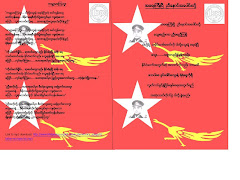Un Chief Calls Emergency Meeting on Burma
By LALIT K JHA
Thursday, May 15, 2008
United Nations Secretary-General Ban Ki-moon on Wednesday held an emergency meeting on Burma with a select group of countries at the UN headquarters in New York in an effort to tackle the humanitarian crisis unfolding in the Irrawaddy delta.
In particular, Ban directed attention toward the rescue and relief operations in Burma in the aftermath of Cyclone Nargis and the Burmese military junta’s refusal to allow foreign aid workers into affected areas.
Besides the 10 members of the Association of Southeast Asian Nations (Asean) and the five permanent members of the Security Council (the US, Britain, France, China and Russia), major donors such as Japan and South Korea attended the meeting, as did Burma’s neighbors India and Bangladesh. The Burmese ambassador to the UN, Kyaw Tint Swe, also addressed the group.
The meeting lasted more than 90 minutes and saw as many as 16 countries speaking on the proposals put forward by the secretary-general. Prominent proposals included a high-level meeting on Burma, better UN-Asean coordination and pressuring Asean to become more involved.
However, little progress was made in terms of consolidating emergency relief for the 1.5 million people stranded in devastated areas of the Irrawaddy delta. The group could not find a solution to the burning issue of effective distribution of relief material and the Burmese authorities opening up their borders to foreign aid workers.
As ambassador after ambassador came out of the meeting and spoke to the eagerly awaiting media outside the meeting hall at the UN headquarters, it became increasingly evident that sharp differences persisted among the member nations—primarily between the US, France and Britain, and Burma's immediate neighbors, including India and China—on how to proceed with the relief operations.
However, both camps insisted that this is a humanitarian crisis and should not be politicized.
"There were expressions of concern that this should not be the subject of politicization,” Ban said, adding: “This is purely, genuinely, a humanitarian crisis. I have assured the delegations that I'll try to lead this humanitarian work in a purely, genuinely humanitarian way."
The secretary-general also noted that he appreciated the "flexibility shown" by the Burmese government in last few days in receiving aid, but insisted that this is not enough.
Among proposals made by the secretary-general were designating a UN/Asean joint humanitarian coordinator, establishing a logistical hub outside Burma and holding a high-level pledging conference.
"We agreed that all the humanitarian assistance should be made now in a more systematic, organized and coherent manner, looking at more mid-term construction issues," he said.
Ban informed the media that he was considering sending Under-Secretary-General for Humanitarian Affairs John Holmes to Burma with a World Food Programme airplane carrying relief supplies.
The Asean foreign ministers are meeting on May 19. Ban is also likely to address a special meeting of the General Assembly on Friday.
Having high expectations from the coming meeting of the Asean foreign ministers in Singapore, Ban said: "I am sure the Asean foreign ministers' meeting will reflect on these specific proposals which I have put forward. Many delegations have expressed their support and on the merit of this issue, but this needs to be discussed with the Myanmarese [Burmese] government, as well as Asean countries."
However, earlier in the day the under-secretary-general of humanitarian affairs expressed his disappointment over the slow response of the Burmese military junta in receiving international aid workers and experts in handling the humanitarian crisis. Holmes said there is "huge frustration" at the UN.
Quoting Burmese officials, Holmes said the official death toll was now 38,491 with 27,838 missing. But the figures could turn out to be significantly higher, he feared. Current estimates pointed to between 1.6 million and 2.5 million people severely affected by the consequences of the cyclone, and there was more heavy rain forecasted, he said.
Holmes added that the UN is in touch with Burma's immediate neighbors and fellow Asean members to encourage them to use their contacts and influences on the junta.
The Burmese ambassador to the UN earlier had insisted that although this was a humanitarian disaster of huge proportions, politicization would further complicate the situation and make challenging situations even more difficult.
The British and US ambassadors, however, said the onus for this was purely on the Burmese regime as it was not doing enough.
"No one is politicizing this issue—certainly not us. But if that aid is held up then it is the Burmese government, which would make it a political issue—no one else," the British envoy, Sir John Sawers, said.
"We feel that there is a sense of real urgency. The overwhelming need, which every speaker endorsed, is getting in aid for the people of Burma, which is desperately needed," he said.
Sawers said he hoped the initiative taken by Ban could be respected and followed by countries of the region, and the international community as a whole, and that the distribution of aid would be managed professionally.
Stating that one of the big issues now is how to get the Burmese authorities to be more open to removing the conditions and restrictions on the supply of humanitarian aid, US Ambassador to the UN Zalmay Khalilzad said, "A clear message was sent by many speakers to the Myanmar authorities that they need to remove those conditions."
Khalilzad added: "We all emphasized that this is a humanitarian situation to which we are all responding and everyone wants to avoid politicizing it. But it will get politicized if the needed assistance is not allowed to arrive in a timely manner to save lives."
Friday, May 16, 2008
Un Chief Calls Emergency Meeting on Burma
Posted by
54freedom
at
12:26 PM
![]()
Subscribe to:
Post Comments (Atom)













No comments:
Post a Comment